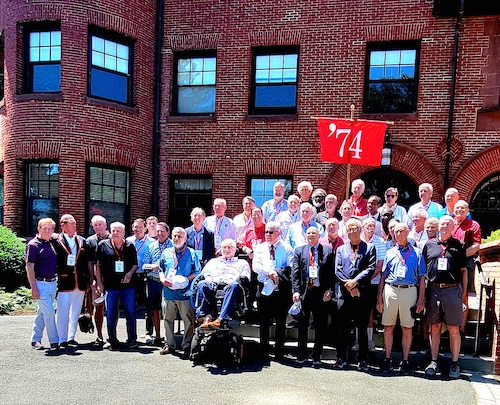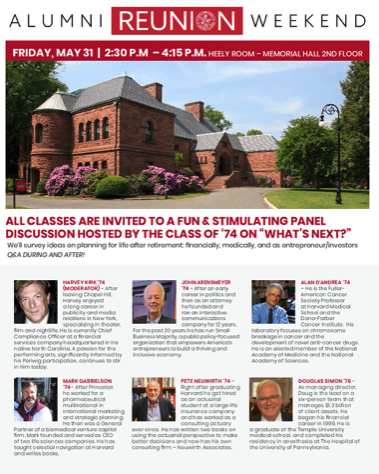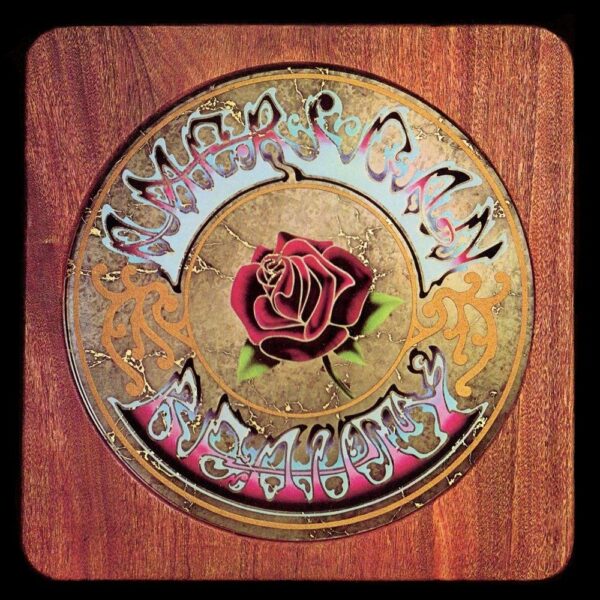Peter Neuwirth was featured panelist at this year’s Lawrenceville Alumni Weekend: “What’s Next”

A Note from Pete, May 31, 2024 — I was honored to be a part of a panel discussion of “What’s Next” that kicked off our 50th High School reunion today. The panel was moderated by Harvey Kirk ’74 and included Alan D’Andrea ’74, Mark Gabrielson ’74, John Arensmeyer ’74, and Doug Simon ’76. As seen by their bios, below, my classmates have each had an enormous impact in their respective fields and I feel very lucky to have been able to be part of the conversation regarding what the future might hold for all of us and how to make the most of it. While the session was about the future, most of the weekend itself was devoted to catching up on the past and finding out which of the “What’s Next” scenarios we all envisioned 50 years ago came to pass. Click here to review my slideshow presentation.
 Meet the Panelists:
Meet the Panelists:
- PETE NEUWIRTH ‘74 – Right after graduating from Harvard, Pete was hired as an actuarial student at a large life insurance company and has worked as a consulting actuary ever since. He has written two books on using the actuarial perspective to make better decisions and last year launched the consulting firm NeuwirthAssociates.consulting.
- HARVEY KIRK ‘74 (MODERATOR) — After leaving Chapel Hill, Harvey enjoyed a long career in publicity and media relations in New York, specializing in theater, film, and nightlife. He is currently Chief Compliance Officer at a financial services company headquartered in his native North Carolina. A passion for the performing arts, significantly informed by his Periwig participation, continues to stir in him today.
- JOHN ARENSMEYER ‘74 — After an early career in politics and then as an attorney, John founded and ran an interactive communications company for 12 years. For the past 20 years, he has led the Small Business Majority, a public policy-focused organization that empowers America’s entrepreneurs to build a thriving and inclusive economy.
- ALAN D’ANDREA ‘74 — The Fuller-American Cancer Society Professor at Harvard Medical School and the Dana-Farber Cancer Institute, Alan’s laboratory focuses on chromosome breakage in cancer and developing novel anti-cancer drugs. He is an elected member of the National Academy of Medicine and the National Academy of Sciences.
- MARK GABRIELSON ‘74—After graduating from Princeton, Mark worked in international marketing and strategic planning for a pharmaceutical multinational. He then became a General Partner of a biomedical venture capital firm. He also founded and served as CEO of two life sciences companies. Mark has also taught celestial navigation at Harvard and written books.
- DOUGLAS SIMON ‘76 — As managing director, Doug leads a six-person team that manages $1.2 billion of client assets. He began his financial career in 1999. He graduated from Temple University Medical School and completed his residency in anesthesia at The Hospital of the University of Pennsylvania.
Learn more: Be sure to read Pete’s essay, Living in Two Worlds. “It will give you more background on where I came from and why I chose Box of Rain for our class playlist,” says Pete, inviting readers to check out a chapter he expects to publish in a new book project: Just another Bozo on the Bus.
 Chapter 2: Echoes from Another Land
Chapter 2: Echoes from Another Land
The Grateful Dead first caught my ear on a soft fragrant afternoon in late April of 1973.
I had just finished my last class of the day and was walking back to my dorm at the Lawrenceville School, a painfully traditional all-male boarding school faithfully modeled after the prestigious “public schools” in England and magically transported to suburban New Jersey. Built by Fredrick Law Olmsted (who also designed Central Park in New York City) in 1883, the school sits less than 10 miles down the road from Princeton University, where an unconscionable percentage of the graduating seniors matriculated each year.
My father, a theoretical mathematician and my mother, an aspiring artist in Princeton believed strongly in giving their child the best education they could afford, and therefore, devoted an extraordinary percentage of their resources to pay the cost of the best private schools I could get into – from the Chapin School where I went to elementary school to Lawrenceville and then eventually to Harvard.
By the time I got to Lawrenceville, 10 years of elite private elementary schooling had prepared me well. Nothing about prep school seemed unusual or unreasonable – not the black ties we had to wear freshman year until and unless we defeated the hated Hill School in football, not the two years of required Greek and Latin taught by old men in tweed coats, not the required attendance at morning Chapel, and definitely not the bucolic lush campus filled with 19th century mansions that had been “repurposed” to serve as “Houses” for 800 white boys destined to join the ruling class. I never questioned my right to a spot among those 800. My intelligence and not my wealth had qualified me to be there, but that didn’t make me any less entitled or oblivious to my privilege. Unlike many of my classmates, I loved my high school and made no excuses for my status.
On this particular day, life seemed particularly good. Lawrenceville’s DNA contains many elements, but none more important than competition, with grades posted on classroom doors every semester and class rankings published in the school newspaper. Almost as important, the school required every student to participate in some kind of sport, if not for the School at least at the intramural level. I loved to compete and even more to win. That year my grade point average had risen to near the top of the class and I had played varsity soccer on our State Championship team. As I walked across the Circle to “Hamill House”, I mused on my recent triumphs and generally felt like I was walking the path I had been born to follow.
As I approached the steps to the patio outside the dorm, I stopped suddenly, hearing a hypnotically syncopated rhythm emanating from an open window on the second floor. The sound hijacked me from my self-satisfied ruminations, and I stood, transfixed, as the long opening jam of “China Cat Sunflower” from the newly released “Europe 72” album gradually resolved into words that lay just on the other side of intelligibility. The music came from another world, and it drew me in.
I started to listen more carefully to the words and as Jerry “rang a silent bell beneath a shower of pearls”, I realized that my classes on Shakespeare and 19th century poetry had only scratched the surface of what language could convey – that music and words could be combined in powerful ways to express meaning in ways that my teachers had never acknowledged.
As the China Cat jam meandered, and then regained direction, transitioning and resolving into a completely different song, I marveled at how the end of one song and the beginning of another could be so undefined. Borders and boundaries suddenly seemed arbitrary and permeable. Was China Cat Sunflower/I Know You Rider one song or two? And what is a song exactly anyway? Clearly most radio stations at the time hadn’t figured it out.
By then, I knew generally who the Grateful Dead were, and had heard a couple of their “hits” on FM radio, but I had never really listened, and certainly never knew how their live shows differed so radically from what they recorded in the studio. At 16, I had also never smoked weed, let alone experienced psychedelics, and even though those drugs can be the keys that unlock the door separating the Grateful Dead and the rest of the world, I simply walked, wide awake, into the “splintered sunlight” and caught a brief glimpse of “another land” – a land that I would soon visit often and get to know very well.
In a very real sense, my life changed at that moment. I was hooked and happily so. I bought as many of their albums as I could afford, eventually getting them all. At that point I didn’t know the Grateful Dead culture. I did know that I had found my favorite music, but I had no idea where following the music would lead.
